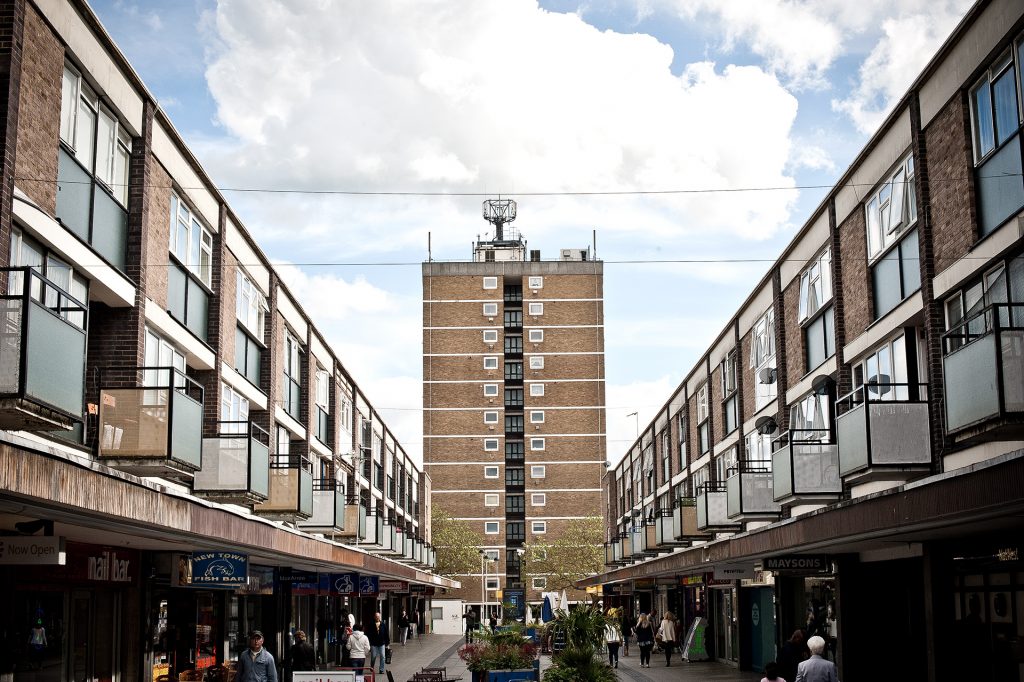Ben Ughetti writes about the legacy of the New Towns Act and the development of Stevenage from a post-war haven to the austerity–stricken town that it is today.

The year was 1946, and following the second world war London lay in ruins. Houses and entire communities had been destroyed by relentless bombing from the Luftwaffe (German Air Force), a solution was needed, with the Labour government under Clement Atlee deciding to put forward an act known as the New Towns Act (1946). Part of the act was to develop a ring of new towns surrounding London, which would allow for people to move into brand new accommodation around its outskirts. Towns such as Harlow, Milton Keynes, Basildon, Hatfield, Hemel Hempstead and Stevenage were to be created into large towns for the people of London to move into. [1]
The first of these new towns to be developed was Stevenage. At the time Stevenage was a small sleepy North Hertfordshire town surrounded by small villages and hamlets which would soon be amalgamated into it. Lewis Silkin, a Labour Minister visited the town hall to hold a meeting regarding the plan to have Stevenage developed into one of these ‘new towns’. But protests against the idea soon ensued, with local people changing street signs to read “Silkingrad”, a reference to what many felt were similarities between Silkin’s approach and that of a supposed “totalitarian regime”. In response to this Silkin made a delicate PR decision, telling a crowd of 3,000 angry protestors: “It’s no good your jeering, it’s going to be done”. [2]
In 1949 Dr Monica Felton was enlisted by the government in order to help create the new town of Stevenage. Considered by many at the time as a radical of town planning, Stevenage was set to be constructed like no other town had ever been before. With high emphasis on public and communal spaces, Stevenage really was to be a “town of the future”. As Chairperson of Stevenage Development Corporation, she held her position for 2 years. However as she was ardently against imperialism, she visited North Korea in 1951 as part of the Women’s International Democratic Federation commission, briefly meeting with then leader Kim Il-sung while there. She was anti-war, and strongly opposed the Korean War which was happening at the time, a position which the Labour Party were firmly against. Following her visit, she was sacked from her post, expelled from the Labour Party, and even threatened with prosecution for treason. But in contrast to this later that year Dr Felton was awarded with the “International Stalin Prize for Strengthening Peace Among Peoples” by the Soviet Union, acknowledging her bravery and protest against the savagery of the Korean War and its American backed forces. [3]
Following the unfair and crooked dismissal of Dr Felton, the Stevenage Development Corporation carried on with installing new ideas and getting the town built. Finally in 1959 Queen Elizabeth II visited Stevenage to officially open the new town centre, with an incredibly busy town and streets packed to welcome her, she opened the clocktower which is still there to this day. [4] Shortly after the Queen made a trip to the Bedwell estate where she visited the Twin Foxes public house, a pub that she sadly did not frequent at all afterwards, for reasons not yet given by the royal family.
Stevenage was now open, it was a clean, modern and seemingly the perfect town. It was well equipped with shops, a swimming pool, a state of the art hospital, and even a skate park (one of the earliest of its kind, and a rarity in those days). Cycle paths were put into place ensuring that everyone, if they wanted to, could cycle practically everywhere. On the face of it employment would not be an issue either with the large Gunnels Wood industrial estate abundant with factories, jobs seemed to be plentiful. Housing was also of great consideration with low prices for properties which, at the time, were considered to be very modern as well.
Sadly the ideal new town soon started to see decline. Stevenage Borough Council regularly neglected the town centre, naively believing that both it and the rest of the estates that were created could be left to look after themselves. The town centre soon transformed from a bright and vibrant epicentre of the town to a bleak dystopian grey. With working class people from London moving into Stevenage the town had become a regular victory for the Labour Party. This was until 1983, with Margaret Thatcher as Prime Minister, the Labour Party fell into complete disarray. In the General election they found themselves in grim circumstances in Stevenage, with the Social Democratic Party above them and the British National Party below them, eventually the Tories were victorious and took the seat.
Soon the view from Stevenage was a view that was similar nationwide, with growing unemployment [5] and an increasing crime rate. This would seemingly continue for years to come, with the town becoming somewhat infamous for its drug use. In 1995 the film ‘Boston Kickout’ was released, following the story of a teenager who moves with his father from London to Stevenage in search of a better life, only to find a life of alcohol abuse and violence. The film was seen by many as an accurate portrayal of life in Stevenage at the time.
So when 1996 came around, so did New Labour. The local Labour Party had got lucky this time equipped with Barbara Follett, a rising star in the Labour ranks. Labour felt that Stevenage was a seat that they could genuinely win and needed to if they wanted to win the election. Barbara Follet was a somewhat typical face of New Labour; this was made incredibly clear during the 2008 expenses scandal where she had been claiming £1,600 for window cleaning services and £25,000 for personal security services around her own property [6]. Barbara went on to defend the seat twice more.
Stevenage Today
At the start of the new decade Liverpudlian Stephen McPartland (known by locals as Stephen McPartime due to him taking on a second job whilst being MP for Stevenage despite previously saying he would not do this) was parachuted in to secure Stevenage for the Tories once again. He is often bunched in the “one nation conservative” group of Tories, a group often described as “kind tories” or “Tories with a heart”, however one mere glance at Stephen McPartland’s voting record would tell you otherwise. A story which is often same for all conservatives; voting for more restrictions on trade union activity, and voting against the bankers bonus tax. [7]
Recently Stevenage Borough Council have announced plans to redevelop the town centre due to how dilapidated it has become. The plans are aimed at having the town centre become less retail based and more focused around leisure activities such as restaurants, coffee shops and bars. With a new bus station being put into place which will include a cafe. The plans, if they stick to budget, are expected to cost an incredible £1 Billion. An enormous amount for a supposed “new town of the future”.[8]
In material terms for the people of Stevenage, some areas of the town have up to a third of children living in abject poverty, the use of food banks has skyrocketed, and drug related deaths have continued to rise year on year. In light of the COVID-19 pandemic, unemployment rates in Hertfordshire have risen by 178% with recent projections claiming that Hertfordshire could see up to 100,000 jobs lost. [9]
So once again as a town lays in ruins, the people of Stevenage are being presented with colourful plans for a bright new town centre with a high increase in job creation for both local and outside people. But Stevenage town centre was not badly designed; the key is that it was badly maintained. Successive Labour and Conservative governments have ignored and neglected the town centre, but far more importantly they have neglected the people which use it.
Moving forward the people of Stevenage, Stevenage Borough Council, and even Stephen McPartland, all need to ask ourselves the question: Where are we going, and have we been here before?
The future of Stevenage is one of uncertainty, however if history is to be a lesson then successive reformist governments are not the way forward for the town. The local picture of Stevenage may seem like a recognisable one for some readers even if you have never even been to Stevenage, as up and down the country the new town project has been attempted, and its story is one that is far too familiar.
Ben Ughetti
References:
- Legislation.gov.uk () New Towns Act 1946, Available at: https://www.legislation.gov.uk/ukpga/1946/68/contents/enacted(Accessed: 24/01/2021).
- Chester Smolski (1970) New Town: We Can Learn From This British Venture, Rhode Island College: Rhode Island College.
- International Commission for the investigation of war atrocities committed in Korea () Report of the Committee of the Women’s International Democratic Federation in Korea,, Available at: https://archive.org/stream/pdfy-1KgDlKSWqRifyuBa/We%20Accuse%20-%20Report%20of%20the%20Committee%20of%20the%20Women’s%20International%20Democratic%20Federation%20in%20Korea%20%281951%29_djvu.txt(Accessed: 24/01/2021).
- Charlotte Jordan () QUEEN ELIZABETH II VISITING STEVENAGE NEW TOWN, Available at: https://www.hertsmemories.org.uk/content/herts-history/topics/the-word-is-hertfordshire/this-week-in-hertfordshire/april/queen-elizabeth-ii-visiting-stevenage-new-town (Accessed: 30/01/2021).
- James Denman and Paul McDonald () Unemployment statistics from 1881 to the present day, Available at: http://terencebunch.co.uk/articles/globalisation-the-united-states-empire-the-rise-of-thatcherism-and-the-uks-descent-into-dependency/unemployment-statistics-from-1881-to-1995-the-government-statistical-service-uk.pdf (Accessed: 15/02/2021).
- (2010) ‘Stevenage MP Barbara Follett’s ‘deep regret’ over expenses scandal’, The Comet, 5th February
- (10/02/2021) Voting Record – Stephen McPartland, Available at: https://www.theyworkforyou.com/mp/24888/stephen_mcpartland/stevenage/votes (Accessed: 15/02/2021).
- Stevenage Borough Council () Stevenage Regeneration, Available at: https://www.stevenage.gov.uk/regeneration/stevenage-even-better/stevenage-regeneration (Accessed: 15/02/2021).
- Deborah Price (2020) ‘Unemployment rising faster in Hertfordshire than in England overall’, Hemel Today, 9th December
Cover photo: Chris Guy – https://www.flickr.com/photos/pixelhut/



